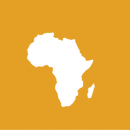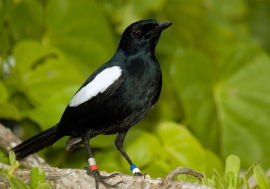Africa Watch
GROUP OF 20
Africa gets seat at policy table
In a move that underscores the shift of global economic power, the Group of Eight (G-8) club of major industrialized economies — the US, UK, Japan, Germany, France, Italy, Canada and Russia — was officially replaced as the world’s top financial forum in late September. The change was announced at the 24–25 September summit of the new Group of (G-20) in the US city of Pittsburgh. First created in late 2008 in the midst of the global economic crisis, the new group includes the members of the G-8, as well as China, Brazil, South Africa and other developing countries.
For Africa, the Pittsburgh summit “comes at a pivotal stage in dealing with the financial crisis,” said African Development Bank President Donald Kaberuka. African economies have been hit hard by the downturn, he noted at the summit, and “it could take years for financing flows to Africa to resume.” Meeting the needs of poorer African countries will be an early test of the G-20’s leadership, he concluded. “If it does so it will enhance its legitimacy in global governance. Failure to do so will call it into question.”
SOUTH-SOUTH
Banking on South America
African and South American leaders initialled a number of new economic cooperation agreements at the second Africa-South America Summit. Held in Isla Margarita, Venezuela, the 26-27 September gathering drew heads of state and senior government officials from 54 African and 12 South American countries to expand cooperation in eight sectors, including agriculture, mining and energy, education and culture, and peace and security.
The leaders also announced creation of a $20 bn Bank of the South to underwrite increased African-South American commerce and investment, with financing primarily from Brazil, Argentina and Venezuela. In a statement that analysts said captured the summit’s assertive tone of the, Ecuadorian President Rafael Correa declared that “we’re done depending on the North. On one side kneeling down to ask for some dollars and on the other sending billions of dollars to them. We’ve had enough of that contradiction.”
The meeting came three years after the first Africa-South America summit in Abuja, Nigeria. The gatherings reflect a dramatic growth in ties between the two continents. Brazil’s trade with Africa, mostly in farm products and manufactured goods, increased from $5 bn in 2002 to almost $26 bn six years later. Brazil is also an important investor, committing some $4 bn to African agriculture since 2003 and training African farmers in biofuel production. Argentina sold $3 bn worth of soybeans, dairy products and grain to Africa last year, making it Africa’s second largest Latin American trading partner.
HIV/AIDS
Vaccine results promising
In September researchers announced that an experimental vaccine succeeded in protecting about one in three test subjects from contracting the Human Immunodeficiency Virus (HIV) that causes AIDS. It is the first time that scientists have succeeded in developing a vaccine that prevents HIV from infecting humans. But it is not yet known why the serum left so many people unprotected or even why it worked in the first place. Scientists at the US National Institutes of Health, which is among the vaccine’s sponsors, say it will be years, if ever, before the vaccine is safe and effective enough to be used widely.
The development of a vaccine with even limited effectiveness would be very good news for sub-Saharan Africa. The region accounted for 67 per cent of the 33 million people living with HIV infections globally and three of every four AIDS deaths in 2007.
Appointments
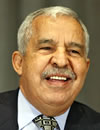 Photograph: UN / Paulo FilgueirasThe UN General Assembly has elected Mr. Ali Abdussalam Treki of Libya as the new president of its 64th Session. Mr. Treki, who assumed the office on 23 September, was his country’s minister of African Union affairs at the time of his election. Having served three times as Libyan ambassador to the UN, Mr. Treki brings a deep knowledge of the UN. He has also played a key role in the African Union and as a mediator in several conflicts in Africa, notably in Sudan, Chad and between Ethiopia and Eritrea, among others.
Photograph: UN / Paulo FilgueirasThe UN General Assembly has elected Mr. Ali Abdussalam Treki of Libya as the new president of its 64th Session. Mr. Treki, who assumed the office on 23 September, was his country’s minister of African Union affairs at the time of his election. Having served three times as Libyan ambassador to the UN, Mr. Treki brings a deep knowledge of the UN. He has also played a key role in the African Union and as a mediator in several conflicts in Africa, notably in Sudan, Chad and between Ethiopia and Eritrea, among others.
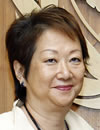 Photograph: UN / Mark Garten Ms. Judy Cheng-Hopkins of Malaysia, the former assistant high commissioner for refugees, has been appointed by the UN Secretary-General as the new assistant secretary-general and head of the Peacebuilding Support Office, which was created in 2006 to support the newly-established Peacebuilding Commission. She has over 30 years of experience in several UN organizations, working on humanitarian, post-conflict, peacebuilding and development issues. Ms. Cheng-Hopkins replaces Ms. Jane Holl Lute.
Photograph: UN / Mark Garten Ms. Judy Cheng-Hopkins of Malaysia, the former assistant high commissioner for refugees, has been appointed by the UN Secretary-General as the new assistant secretary-general and head of the Peacebuilding Support Office, which was created in 2006 to support the newly-established Peacebuilding Commission. She has over 30 years of experience in several UN organizations, working on humanitarian, post-conflict, peacebuilding and development issues. Ms. Cheng-Hopkins replaces Ms. Jane Holl Lute.
The UN Educational, Scientific and Cultural Organization (UNESCO) has elected Ms. Irina Bokova of Bulgaria as its new director-general. Ms. Bokova, the first woman in UNESCO’s top position, has held various posts within her country’s diplomatic service since October 1991, including as foreign minister and most recently as ambassador to France. She will replace Mr. Koïchiro Matsuura of Japan.
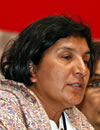 Photograph: Society for International Development The UN Human Rights Council has appointed Ms. Rashida Manjoo, a South African lawyer, as the new UN special rapporteur on violence against women, for a term that lasts until June 2012. Previously, Ms. Manjoo taught and conducted research at several universities in the US and South Africa. Like other rapporteurs who report to the Human Rights Council, she will serve in an unpaid and independent capacity. She succeeds Ms. Yakin Ertürk of Turkey
Photograph: Society for International Development The UN Human Rights Council has appointed Ms. Rashida Manjoo, a South African lawyer, as the new UN special rapporteur on violence against women, for a term that lasts until June 2012. Previously, Ms. Manjoo taught and conducted research at several universities in the US and South Africa. Like other rapporteurs who report to the Human Rights Council, she will serve in an unpaid and independent capacity. She succeeds Ms. Yakin Ertürk of Turkey

